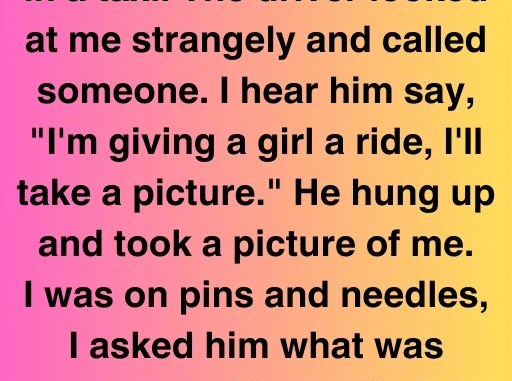
One evening, I was heading home in a taxi when I noticed the driver stealing glances at me. Suddenly, he made a quick call, and I overheard him say, “I’ve got a girl in my car. I’ll send you a picture.” Then he hung up and snapped a photo of me.
My heart skipped a beat. I asked him what was going on, and he gave me a hesitant smile before answering, “I’m sorry, miss… but you look exactly like someone who vanished two years ago. My friend’s niece. We’ve been searching for her ever since.”
I froze. “What are you talking about?”
He kept his eyes on the road but nodded. “Same features. Same scar by the eyebrow. You’re not from here, are you?”
I told him I had only moved to the city for university and that he was mistaken. He didn’t argue—just said softly, “Maybe so. But you need to understand… her family’s been shattered ever since she disappeared.”
Something in his tone wasn’t threatening at all. It wasn’t creepy—it was heavy with grief. Still, I felt strange, torn between fear and sadness.
Before I got out, I asked, “What was her name?”
“Alina,” he said quietly.
That name clung to me all night. Even as I tried to sleep, his last words echoed in my head: “Sometimes, missing people don’t even know they’re missing.”
The next day, I gave in to my curiosity and searched her name online. There she was—Alina Popescu, 19 years old, missing since 2023. I stared at the photos; the resemblance wasn’t exact, but close enough to cause confusion. News reports, vigils, unanswered questions… it hit me harder than I expected.
I should’ve let it go. But days later, I found myself near her old neighborhood. I even wandered into a local shop to ask if anyone remembered her. The cashier said, “Everyone knew Alina. She worked at the flower shop down the block. Her aunt still runs it.”
I don’t know why, but I went.
The flower shop smelled of roses and lavender. An older woman looked up from trimming stems. I hesitated before telling her, “Someone mistook me for your niece.”
Her eyes widened. She stepped closer, whispering, “You really do look like her.”
I assured her I wasn’t. But she invited me to sit. She shared stories about Alina—how she scribbled poems on flower tags, slipped extra daisies to sad customers, and loved deeply. Her voice trembled when she said, “She never lied, never ran away. That’s why this disappearance makes no sense.”
I left hours later with a dried flower she pressed, now sealed in plastic—a gift from her aunt.
Weeks passed, but I couldn’t shake the pull of this story. Then I got a message from Livia, Alina’s cousin. She’d heard about me through the shop and wanted to meet.
Over coffee, she asked about the driver. When I described him, she frowned. “He’s not family. I don’t know who he is.”
That was the first twist.
I dug into my ride history and found his name: Ionuț G. The taxi company confirmed he’d been fired months earlier for “policy violations.” Nothing serious on paper, but something was off.
When I told Livia, she took it to investigators. Soon after, she revealed the truth: Ionuț had been obsessively photographing young women who resembled Alina. He lived only blocks from the flower shop. And on the day she vanished, records showed she had booked a ride… with him.
Police searched his home. They didn’t find Alina, but they uncovered disturbing evidence linking him to her stalking. Enough to reopen the case.
For months, I stayed in touch with her family. Then, one night, I got the call.
“She’s alive,” Livia said, her voice trembling. Alina had turned up at a shelter 100 kilometers away under a false name.
She had been hiding out of fear and shame. The night she disappeared, Ionuț had picked her up and tried something awful. She escaped, fled, and was rescued by strangers. But the trauma silenced her. Until now.
When I met her weeks later, she hugged me tightly. “I heard you helped find me. Thank you for not giving up.”
I had no words—only tears.
Sometimes we stumble into someone else’s story by accident. Sometimes a small decision—to ask, to listen, to care—creates ripples we don’t even see.
Alina is safe now. Healing. Her family whole again. And I carry with me the lesson I’ll never forget:
We all have the power to notice. To question. To care. And sometimes, that’s all it takes to bring someone home.